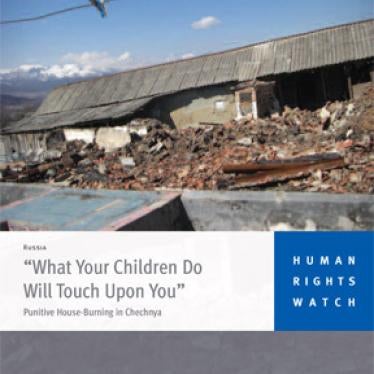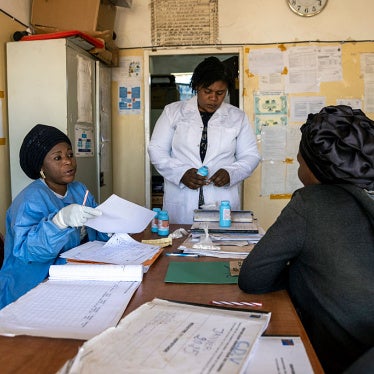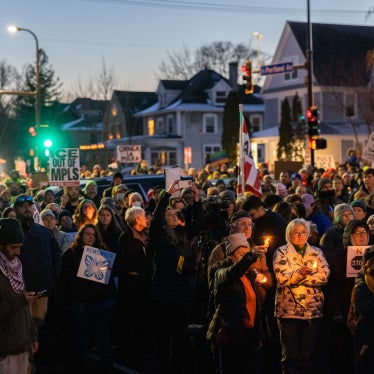The attacks usually occur in the dead of night. Vehicles full of uniformed men pull up to a home, rouse the terrified occupants and herd them outside. Then the gunmen methodically ransack the house, pile the furniture and other belongings, douse it all with fuel, and light a match.
"There were so many of them, they were shooting in the air," one witness said, "and all the neighbors were just hiding in their houses afraid to step out until they finally left and everyone started trying to put the fire out. The children were beyond themselves with fear ... In the end the house burned completely."
Since 2008, a wave of punitive house burnings has started in Chechnya, the latest chapter in the blood-soaked history of this republic in Russia's North Caucasus. A new report from Human Rights Watch documents more than a dozen incidents of torchings in which the authorities were clearly responsible. The targets are families of young men who have gone underground and are suspected of having joined the anti-government insurgency. The arsonists are mainly law enforcement and security personnel under the de facto control of the republic's president, Ramzan Kadyrov.
The report, "What Your Children Do Will Touch Upon You," is based on field research conducted in close cooperation with Memorial Human Rights Center, a leading Russian human rights organization. During two research trips to Chechyna in March and April 2009, a Human Rights Watch researcher visited and photographed house-burning sites and interviewed 37 people, including owners and former residents of burned homes, witnesses of the house burnings, human rights activists, lawyers, government officials, and law enforcement personnel.
The goal of the house-burning campaign? To punish the families of alleged insurgents, misusing Chechen customs of familial responsibility, and to coerce the insurgents to surrender. Bent on toppling the Moscow-backed government and creating an Islamic state in the Caucasus, the insurgency also draws on a variety of violent tactics - including killings and house burnings - against police, security personnel, administration officials, and their family members. However, the report points out, unlawful tactics by insurgents do not justify similar tactics by government forces. It calls on Russian authorities to stop the attacks and punish those responsible.
All the families whose homes were burned that were interviewed by Human Rights Watch have close relatives, usually sons or nephews, who are alleged insurgents. In most cases law enforcement and local administration officials had strongly pressured the families to bring their relatives home "from the woods" with threats of severe repercussions.
"They kept coming in the middle of the night or in the small hours of the morning," one man said. "They yelled obscenities and beat us. ... The Chechens kept telling me, ‘Why don't you make them return? They are your family and, therefore, your responsibility.'"
Arson victims have few options. Firefighters almost always fail to respond to calls for help. Victims are often told complaints to authorities will lead to further repercussions. To date, not a single criminal case has been opened based on allegations of house burning in Chechnya. One victim asked a friend, a local policeman, what he could do. The policeman responded, "Nothing really. Not only can I not help you but there is nothing I can even think of. Those armed units have free rein. They have all the power."
Main Recommendations:
To the Government of the Russian Federation
- Immediately stop collective punishment in Chechnya, including house burning and other forms of persecution against families of alleged insurgents.
- Ensure access to the region for international monitors, including the UN special rapporteurs on torture, the right to housing, and violence against women.
- Ensure meaningful accountability mechanisms for such violations as house-burnings, cruel, inhuman and degrading treatment, abduction-style detentions, and other violations by security services, the military, and law enforcement agencies.
- Bring perpetrators of serious abuses to justice in transparent investigations and proceedings.
To Russia's International Partners
- Call on the Russian government to stop collective punishment, including house burnings, and overall to put an end to human rights violations in Chechnya.
- Call on the Russian government to allow unhindered access to the North Caucasus region for international monitors.
- Call upon Russia to ensure unhindered work of Russian and foreign journalists and human rights defenders in Chechnya and broader in North Caucasus.
Fact File
At least 25 cases of punitive house burnings took place between June 2008 and March 2009 in seven districts of Chechnya.
High-level Chechen officials, including President Kadyrov, who was nominated to the post by President Vladimir Putin of Russia, have made public statements explicitly stating that insurgents' families should expect to be punished unless they persuade their relatives to surrender.
The insurgents' proclaimed long-term goal is to create an Islamic state in the Caucasus. Their short-term agenda can be generally described as destabilizing the situation in the North Caucasus region.







